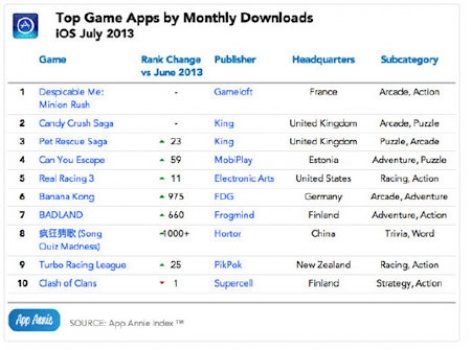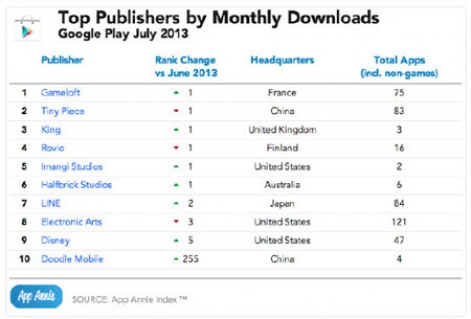So as a lowdown and dirty hacker of data, I've been thinking - How can I make any sense of the monthly chart round ups thrown out by market intelligence companies?
App Annie's July 2013 figures for the Apple App Store and Google Play provided my opportunity.
B of the buck
What I've done is look at the top 10 lists of companies ranked in terms of game downloads and revenue on the App Store and Google Play.
(Of course, both of these metrics are estimated by App Annie so not necessarily accurate figures; something we should always remember.)
My simplest ranking is to look at companies who feature on both formats' top grossing charts.
This is inspired as I've always been surprised market intelligence companies don't construct meta-charts of the top grossing company across all the app stores that they rank.
After all, Supercell only releases on iOS so unless you have the raw figures it's impossible to compare it to iOS and Android publishers like King or GungHo Online.
I don't have those raw figures, so I can only rank the companies that appear in both top 10 top grossing charts for App Store and Google Play. They rank as below.
- 1. GungHo Online
- 2. King
- 3. LINE
- 3. GREE
- 5. DeNA
- 6. EA
- 7. Kabam
Clearly, you don't have to be a genius to understand that these are the companies who are making the big money at the moment.
Doing it best
We can pull out some secondary conclusions too, by looking at whether any of these top grossing companies have games that are being heavily downloaded.
Obviously this is somewhat dependent on when their top grossing games were released - games tend to be downloaded most at launch - but neither GungHo, GREE, DeNA or Kabam feature in the top 10 list of companies with the most downloaded games in July, on the App Store or Google Play.
This means they are generating their high income mainly from existing audiences, rather than spending a lot of marketing money to keep their download volumes high.
Hence, these are the companies who best understand how to operate and monetise their audiences.
Conversely, King is the only company with 2 games in the top 10 most downloaded list on App Store and Google Play. In its own way, this is impressive, although it would be interesting to know the split between King's oft-vaunted social virality and how much it spends on marketing and user acquisition.
The old guard
My final conclusions concerns four well-know companies at different stages of their free-to-play journey.
With games such as The Simpson: Tapped Out and Real Racing 3, EA has demonstrated it now knows exactly what it's doing with F2P games.
As well as featuring in the top 10 top grossing company list for App Store and Google Play, it also features in both formats' top 10 companies in terms of the most game downloads. This is partly because it has a lot of games available, a lot of big brands, and also spends a lot on marketing.
In contrast, Gameloft's recent massive success with Despicable Me: Minions Rush in terms of download numbers, hasn't yet been matched by its top grossing performance, especially on Android. (It ranks the 7th top grossing company on App Store.)
Bluntly, the game has been the most downloaded title on iOS and Android for two months now, so it should be making more money; something we looked at in a recent Monetizer column.
The two other companies worth investigating are Rovio and Disney.
Rovio features on the list of the top 10 companies in terms of downloads on App Store and Google Play, but not in terms of top grossing companies on either, because it hasn't properly deployed free-to-play mechanics in its games, which are mainly paid.
It's a similar situation with Disney, which also relies on paid game sales rather than F2P mechanics. Its ability to release free versions of its games sees it feature in the top 10 company list in terms of downloads but not in terms of top grossing.
You can see App Annie's overly detailed analysis of its own data here, or check out the basic charts below.
























